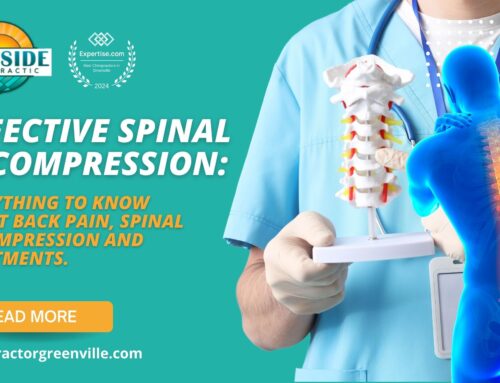Introduction
Are you or someone you know considering spinal surgery? Are aware about the age limit for spinal surgery? If so, you might be wondering if there’s an age limit for undergoing such a procedure. This article aims to shed light on the topic, especially focusing on the age restrictions that may apply to spinal surgery. At Eastside Chiropractic PA in Taylors, SC, we believe in providing you with the most accurate and comprehensive information to make an informed decision about your health.
What is Spinal Decompression?
Spinal decompression is a non-surgical treatment that aims to alleviate back pain by reducing pressure on the spinal discs. Using a traction table or similar motorized device, this therapy seeks to stretch and relax the spine gently. The process encourages better blood flow and promotes healing in the affected areas. This method can be particularly beneficial for individuals dealing with herniated discs, degenerated discs, and sciatica.
Understanding Spinal Surgery
Spinal surgery encompasses a variety of procedures aimed at correcting issues related to the spinal column. From minimally invasive techniques to more extensive operations, spinal surgeries address complications like herniated discs, spinal stenosis, and scoliosis. Common procedures include spinal fusion, laminectomy, and discectomy.
Age Limit for Spinal Surgery: Does Age Matter?
When considering spinal surgery, age can indeed play a significant role. While some might think that spinal surgery is only for older adults, younger individuals also sometimes face conditions that require surgical intervention. Medical professionals do not adhere to a one-size-fits-all age limit for spinal surgery; instead, the decision is influenced by a range of factors.
Factors Influencing Age Limits for Spinal Surgery
Physical Health Condition
Physical health is a primary consideration. Someone in their late 60s or 70s in generally good health may be a more suitable candidate for spinal surgery compared to a younger person with severe health issues. Physicians evaluate the overall health, co-existing medical conditions, and physical fitness of the patient before recommending surgery.
Severity of Spinal Issue
The severity of the spinal problem also affects the decision. If the spinal condition severely impairs quality of life and non-surgical treatments aren’t effective, physicians might recommend surgery regardless of age.
Recovery Capabilities
Recovery capabilities differ from person to person. A younger individual may have better healing capabilities, reducing the risk of post-surgical complications, whereas older adults may require more cautious monitoring and a longer recovery period.
Common Age-related Concerns in Spinal Surgery
Bone Density Issues
Bone density decreases with age, making older adults more susceptible to fractures during surgery. This concern prompts healthcare providers to be more cautious with elderly patients.
Healing Timeframes
Healing and recovery time generally take longer for older adults. Younger individuals tend to recover faster, benefiting from their natural resilience and quicker cell regeneration.
Risks of Complications
Older age can be associated with higher risks of complications during and after spinal surgery. These can include infections, slower tissue healing, and adverse reactions to anesthesia.
Spinal Surgery in Younger Patients
Typical Age Range for Young Patients
Young patients, typically ranging from teenagers to individuals in their late 30s or early 40s, may undergo spinal surgery if non-surgical treatments fail to alleviate their condition or if their spinal issue significantly affects their lifestyle.
Concerns and Precautions
In younger patients, doctors emphasize precise diagnostics and minimally invasive surgical techniques to minimize long-term impacts. Pre-surgical evaluations focus on ensuring that the benefits outweigh the risks of undergoing surgery at a young age.
Spinal Surgery in Older Adults
Typical Age Range for Older Patients
For older adults, spinal surgery is generally considered when other treatments have been exhausted. Patients in their late 50s and beyond are frequently evaluated for their ability to tolerate surgery and recover effectively.
Special Considerations and Risks
Special considerations for older adults include a thorough assessment of cardiovascular health, bone density, and the presence of other chronic conditions. The surgical team aims to minimize risks by carefully planning the procedure and closely monitoring post-surgical recovery.
Case Studies: Success Stories across Age Groups
Young Patient Success Story
Consider a young athlete in his mid-20s who suffered from a herniated disc. After unsuccessful physical therapy and medication, he underwent minimally invasive spinal surgery. The operation was a success, allowing him to return to his sports activities within months.
Older Patient Success Story
An example from the older demographic includes a 68-year-old woman with severe spinal stenosis. Despite the increased risks due to her age, the surgery significantly improved her mobility and quality of life, proving that age is not a definitive barrier to successful outcomes.
Non-Surgical Alternatives to Spinal Surgery
Before jumping into surgery, non-surgical treatments should be explored:
Physiotherapy
Regular physiotherapy can help strengthen muscles around the spine and alleviate pain symptoms.
Medications
Over-the-counter pain relievers and anti-inflammatory drugs can manage pain and reduce inflammation.
Lifestyle Changes
Proper posture, regular exercise, and weight management can provide significant relief from spinal issues.
Spinal Decompression as a Non-Surgical Solution
Benefits and Effectiveness
Spinal decompression offers numerous benefits, including pain relief, non-invasiveness, and minimal recovery time. Many patients find significant improvements after a series of decompression sessions.
Who is it For?
This treatment is particularly beneficial for those who suffer from chronic back pain but are not ideal candidates for surgery due to age, health conditions, or personal preferences.
Choosing the Right Option for Your Age and Condition
The best way to decide whether to proceed with spinal surgery or explore alternative treatments is through a personal medical evaluation. Consulting a specialist helps in understanding the specific nature of your spinal condition and assessing the risks and potential outcomes.
Benefits of Consulting Eastside Chiropractic PA
At Eastside Chiropractic PA, we pride ourselves on our expertise and patient-centered care approach. Our skilled professionals are committed to providing tailored treatments that address your unique needs. Whether you’re considering spinal decompression or evaluating the potential for surgery, we’re here to help you make informed decisions.
Frequently Asked Questions on Spinal Surgery Age Limits
1. Is there a strict age limit for spinal surgery?
No, there is no strict age limit. The decision is based on individual health conditions, severity of the spinal issue, and recovery capabilities.
2. Are younger patients less likely to need spinal surgery?
Not necessarily. While non-surgical treatments are often preferred for younger patients, surgery may be required if these treatments fail to provide relief.
3. What are the risks for older adults undergoing spinal surgery?
Older adults face higher risks of complications such as infections, slower healing, and adverse reactions to anesthesia. A thorough pre-surgical evaluation helps mitigate these risks.
4. Can spinal decompression be an effective alternative to surgery?
Yes, spinal decompression is a non-surgical treatment offering significant pain relief and improvements for many individuals, especially those not ideal for surgery.
5. How can I determine if spinal surgery is the right option for me?
Consulting a specialist and undergoing a comprehensive medical evaluation helps determine the best treatment option for your specific condition and age.
Conclusion
When it comes to spinal surgery, there isn’t a one-size-fits-all answer. Age is only one of many factors that influence whether surgery is the appropriate course of action. Both younger and older patients can undergo successful spinal surgery, provided that thorough medical evaluations are conducted. Non-surgical alternatives like spinal decompression offer viable solutions for those looking for less invasive treatment options. At Eastside Chiropractic PA, we’re committed to helping you navigate your options and achieve the best possible outcomes for your spinal health.


